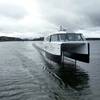The British government said on Tuesday it would split a new order for Type 45 destroyers for the Royal Navy between BAE Systems and Vosper Thornycroft.
But BAE, which had been trying to win the whole deal, was quick to say the delay before work began meant it would cut more than 1,000 jobs at shipyards in Scotland and northwest England.
"We have developed a revised strategy which allocates work on the ships between the two shipbuilders for the whole class of Type 45 destroyers," a top U.K. government official said.
Britain agreed a one billion pound ($1.4 billion) contract late last year for three of the destroyers and said then it envisaged building a fleet of up to 12 in all.
BAE Systems Marine then made a pitch to build all the later batch of destroyers and after long consultation, the company has decided not to accept the company's offer to be sole contractor, allowing Vosper a share of the spoils.
"This approach gives Vosper Thornycroft a defined and significant role in the Type 45 program," the official said. That should safeguard some 650 jobs at the company for several years.
But it elicited a swift and brutal reaction from BAE. It said it was laying off 1,000 workers in its Govan and Scotstoun shipyards in Glasgow because of a short-term lack of orders.
The announcement secured a long-term future for the historic Clydeside yards, BAE said, but failed to provide any plug for the gap in orders until the destroyer work begins in 2002.
"It is therefore with regret that BAE Systems Marine is today announcing 1,000 redundancies on the Clyde, taking effect progressively over the next six months," it said in a statement.
BAE added that it would be cutting 150 more jobs at its Barrow shipyard in northwest England.
Citing the layoffs as excessive, Unions said that the actions would aid to the slow-down of Britain's once-mighty shipbuilding industry.
"I knew the company were arguing they were carrying several hundred surplus employees, but I didn't think it would be 1,000. That's the worst guesstimate I've heard," a union official said.
He added he would be meeting BAE in the next 48 hours to demand that the workers - many of whom came from Scotland's North Sea oil industry - be given the chance to transfer to other areas within the parent company.
A defence ministry official said BAE's plan to take all the work had been targeted at the Barrow shipyard and that none of the work would have gone to Govan.
"Yes there are job losses, but the (Govan) yard will not close, which had been a real possibility," he said.
Vosper's chief executive Martin Jay, unlike the Unions, was optimistic about the yard's strategic move.
"This revised procurement policy provides us with longer- term security and is another move to alleviating the peaks and troughs that are traditional problems in shipbuilding," he said in a statement.
"The strategy involves a commitment now to six ships of the planned class of 12 ships, doubling the number on order," an official said. "This larger volume of guaranteed work... will allow the industry to make long-term investment decisions."
Analysts were not shocked by the decision, announced after the stock market had closed, saying investors already knew BAE's three shipyards had too much capacity. An adverse share price reaction on Wednesday was unlikely.
"I don't think it would be that negative. We all know they are short of work," said an ING Barings analyst.
Featured videos

Unlock Onboard Data Efficiencies

Tracking Foreign Vessels Working in the U.S. Jones Act Market

Inmarsat Enhances Service to Drive Digitalization
Subscribe for
Maritime Reporter E-News
Maritime Reporter E-News is the maritime industry's largest circulation and most authoritative ENews Service, delivered to your Email five times per week









